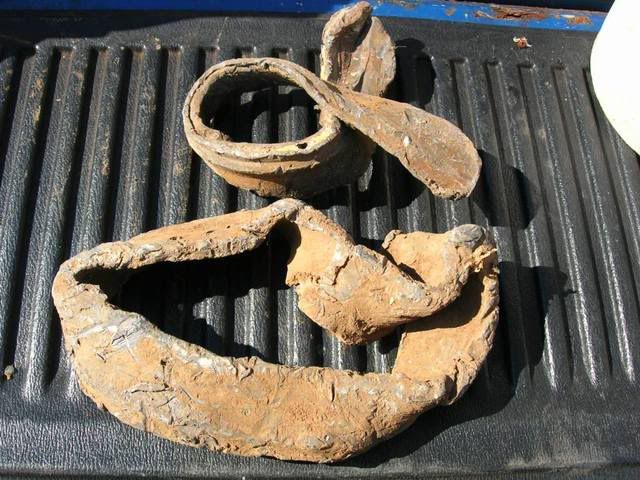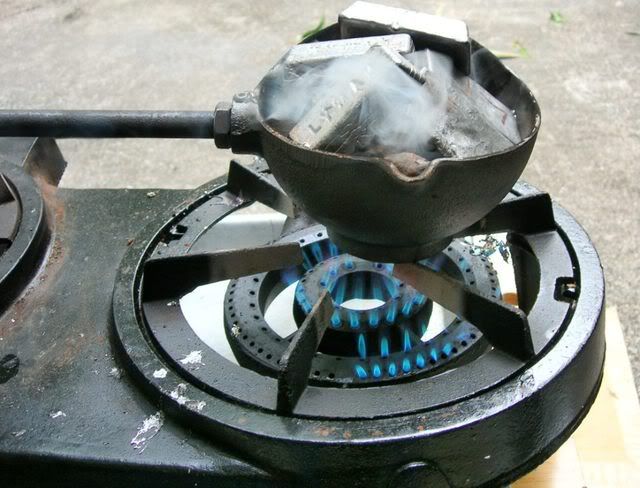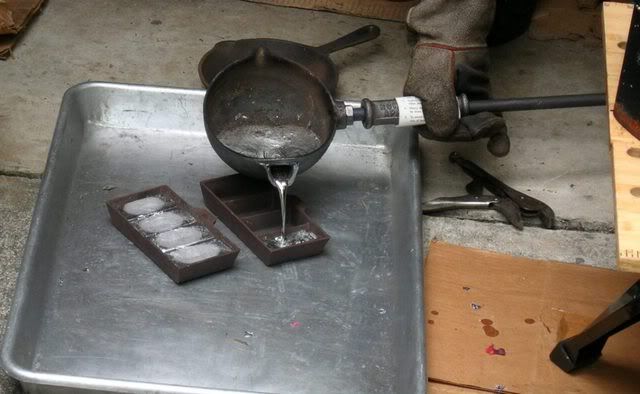Ok, well im.thinking maybe ill just start casting for my pistols then. Maybe ill just make the bars and start stock piling them....ill be a years salary, that sometime next year the price of lead will skyrocket thanx to obama, at the very least maybe i can spend $300-400 and turn around and make $1000-2000.
You are using an out of date browser. It may not display this or other websites correctly.
You should upgrade or use an alternative browser.
You should upgrade or use an alternative browser.
considering casting....is it worth it?
- Thread starter Jeff2131
- Start date
I cast some Minie balls, because I could not buy them locally, I cast some 30 caliber rifle bullets. All in all, I spent a lot more money in casting equipment then it was worth.
I have purchased cast lead pistol bullets from one caster for over 25 years. The price is great, performance great. When I figure the time and effort to cast all the pistol bullets I have shot, I would still be out casting, sizing, trying to find tin, lead.
I don't think casting is worth the bother if you can find a good source of commercial cast bullets.
But if you have lots of time to waste, then go for it.




I have purchased cast lead pistol bullets from one caster for over 25 years. The price is great, performance great. When I figure the time and effort to cast all the pistol bullets I have shot, I would still be out casting, sizing, trying to find tin, lead.
I don't think casting is worth the bother if you can find a good source of commercial cast bullets.
But if you have lots of time to waste, then go for it.




Boomer58cal
New member
Jeff as has been said do not try it with batteries. It is not worth it.
I'm just curious why?
My dad worked at C&D battery and he's been using lead out of batteries for decades. I know some of the newer batteries don't have that much lead in them but...What's the big deal?
Boomer
Battery lead is alloyed with things like calcium and strontium. When you mix that with lead/antimony/arsenic alloys (wheel weights and bullet alloys), you can get various poison gasses created, like arsine and stibine.
The poison gas doesn't necessarily happen when the metal is hot, more likely it's when the dross and slag you skim off gets wet days or weeks later (in other words, when you're not expecting it)
The poison gas doesn't necessarily happen when the metal is hot, more likely it's when the dross and slag you skim off gets wet days or weeks later (in other words, when you're not expecting it)
Last edited:
Here's why
Read this, then if you still insist on it R.I.P.
http://castboolits.gunloads.com/showthread.php?138362-Why-Car-Batteries-Are-Dangerous
Read this, then if you still insist on it R.I.P.
http://castboolits.gunloads.com/showthread.php?138362-Why-Car-Batteries-Are-Dangerous
Last edited:
Sure Shot Mc Gee
New member
In all honesty. If you don't shoot allot is it worth it? No. Not hardly. Better off buying your lead bullets from a caster in the business of making bullets. Ordered in such a way that's most suitable for your particular weapon's need. If your concern is the ever rising cost of bullets. (Buy in large bulk quantity) to help hedge against those ever increasing costs. If you consider the cost of getting into casting ($) and the need or access to raw materials at your whim (more $). Consider this: fewer & fewer business place's bother with the collection of lead or handle it as a product everyday.considering casting....is it worth it?
Since you said your a recreational shooter shooting once or twice a week. Think long term. Will you be doing the same in 10 plus years? {or will your interest's change?} Otherwise being a Wrench with spare money in Ye Ol' Wallet. Why not get into making your own. Spur the economy as its said. Casting: All it does occasionally is tie up some of your free time like any other hobby. Good luck w/ that decision.
To be honest I got into casting as a way to feed my 454 the bullets I wanted to shoot for a price way less than what I was paying for the same ones made commercially. They were $35'ish per hundred less shipping. Pick up two hundred and throw close to $12 in for shipping that was darned near a hundred bucks per order.
Now I already had some wheel weights I got for free, and the Lee 4-20 which I had purchased years before to pour up large surf weights with. So figuring in the cost of the mold and some gas checks I happily found on ebay, I added in around a hundred bucks for tools.
So I re-purposed the 4-20 to pour bullets, and with only 50# of wheel weight alloy I was able to pour up a little over 1100 of my own. Figuring in the mold and GC's at $100, and using the prices paid for the commercial only less shipping I saved close to $300 doing it myself. Even if I had purchased the 4-20 and the alloy, I would have still saved close to a hundred bucks with my initial #50 of wheel weights.
So in my mind yes for the calibers I shoot a lot it is well worth it, not to mention once you have the mold, and some alloy stashed back your set for when times get tough or even tougher then they are now. I might have gotten into it a bit more than some once I started pouring up HP's and working up the alloy I needed, but still I can now pour cast bullets in both solids and HP's for nearly all of my rifles and handguns so I do not feel it when things get tight.
As for buying bulk, I agree there is no substitute for when you can afford it. I did so with my brass, primers, powder, and jacketed bullets, so I am in pretty good shape with them as well. Even so, once your done with them, if there is a shortage or outage, I am still in fair shape for quite a while.
The casting thing has brought a whole new dimension to handloading as well. I now have loads which actually work as good or better than the jacketed loads I was using, but use less powder to do it, and also do not impart as much wear and tear on my guns as did the jacketed loads.
Sort of like buying a vehicle. While a Toyota Corolla, or F-150 works great for a lot of folks, I would have a hard time trying to pull my 16,000 pound tractor around with either when I need to move it. So I have a Ram 3500 which has more than enough under the hood and chassis to get the job done.
Now I already had some wheel weights I got for free, and the Lee 4-20 which I had purchased years before to pour up large surf weights with. So figuring in the cost of the mold and some gas checks I happily found on ebay, I added in around a hundred bucks for tools.
So I re-purposed the 4-20 to pour bullets, and with only 50# of wheel weight alloy I was able to pour up a little over 1100 of my own. Figuring in the mold and GC's at $100, and using the prices paid for the commercial only less shipping I saved close to $300 doing it myself. Even if I had purchased the 4-20 and the alloy, I would have still saved close to a hundred bucks with my initial #50 of wheel weights.
So in my mind yes for the calibers I shoot a lot it is well worth it, not to mention once you have the mold, and some alloy stashed back your set for when times get tough or even tougher then they are now. I might have gotten into it a bit more than some once I started pouring up HP's and working up the alloy I needed, but still I can now pour cast bullets in both solids and HP's for nearly all of my rifles and handguns so I do not feel it when things get tight.
As for buying bulk, I agree there is no substitute for when you can afford it. I did so with my brass, primers, powder, and jacketed bullets, so I am in pretty good shape with them as well. Even so, once your done with them, if there is a shortage or outage, I am still in fair shape for quite a while.
The casting thing has brought a whole new dimension to handloading as well. I now have loads which actually work as good or better than the jacketed loads I was using, but use less powder to do it, and also do not impart as much wear and tear on my guns as did the jacketed loads.
Sort of like buying a vehicle. While a Toyota Corolla, or F-150 works great for a lot of folks, I would have a hard time trying to pull my 16,000 pound tractor around with either when I need to move it. So I have a Ram 3500 which has more than enough under the hood and chassis to get the job done.
I think WW's will soon be too contaminated with zinc to be useful. The manufacturers don't care what the alloy is as long as the weight is in tolerance, and they have big injection molding machines that will work just fine with dubious alloys. So what is their incentive to meticulously sort their recycled weights?
I have a couple of hundred pounds of WW ingots, but mostly I shoot bullet-trap lead from an indoor range. I have no idea what the alloy actually is, it's kind of soft but it doesn't tarnish like pure lead. It makes *great* .38 Special and .45 Colt bullets without any additions, and that's mostly what I cast.
I still have the WW ingots if I want to cast really hard bullets, and I still buy some bullets for loading .357 Magnum, .30 Carbine, etc.
I have a couple of hundred pounds of WW ingots, but mostly I shoot bullet-trap lead from an indoor range. I have no idea what the alloy actually is, it's kind of soft but it doesn't tarnish like pure lead. It makes *great* .38 Special and .45 Colt bullets without any additions, and that's mostly what I cast.
I still have the WW ingots if I want to cast really hard bullets, and I still buy some bullets for loading .357 Magnum, .30 Carbine, etc.
totalloser
New member
Strontium is HORRIBLY bad stuff. You don't EVER want to expose yourself to it. Your body metabolizes it as calcium and it supplants it in your bones.
That's without getting into the issues of oxidization which facilitate lead ingestion which otherwise is for the most part insoluble. Bad mojo.
Leave the batteries to the recycler facilities to deal with.
If in doubt, google some of those chemicals and look at the wiki links or msds sheets. Pretty awful stuff.
As to zinc, I suspect they'll keep screening out the lead based alloys and separating them. CA is outlawing (don't get me started) lead based wheel weights, so if the alloy is contaminated, it won't be legal to sell in CA.
Probably they will do as I do and raise the temp in the smelter batch slowly so they can melt off the lead alloys and then strain off the zinc for further processing. If you are patient, it is QUITE easy to not melt the zinc.
IMO what is more likely is that WW manufacturers will get tired of making multiple batches for different states, and will dump pb based weights. This will be a big bummer for scavengers, but manufactured ingot price may come down due to a lack of demand from WW manufacturers.
There will always be sources for scrap though. Xray rooms, scrapping old poured lead fittings, linotypes etc. The only component that makes WW alloy particularly special is the arsenic which facilitates heat treatment. I am unaware of sources for scrap arsenic, but it doesn't take much to attain the benefits.
That's without getting into the issues of oxidization which facilitate lead ingestion which otherwise is for the most part insoluble. Bad mojo.
Leave the batteries to the recycler facilities to deal with.
If in doubt, google some of those chemicals and look at the wiki links or msds sheets. Pretty awful stuff.
As to zinc, I suspect they'll keep screening out the lead based alloys and separating them. CA is outlawing (don't get me started) lead based wheel weights, so if the alloy is contaminated, it won't be legal to sell in CA.
Probably they will do as I do and raise the temp in the smelter batch slowly so they can melt off the lead alloys and then strain off the zinc for further processing. If you are patient, it is QUITE easy to not melt the zinc.
IMO what is more likely is that WW manufacturers will get tired of making multiple batches for different states, and will dump pb based weights. This will be a big bummer for scavengers, but manufactured ingot price may come down due to a lack of demand from WW manufacturers.
There will always be sources for scrap though. Xray rooms, scrapping old poured lead fittings, linotypes etc. The only component that makes WW alloy particularly special is the arsenic which facilitates heat treatment. I am unaware of sources for scrap arsenic, but it doesn't take much to attain the benefits.
Last edited:
